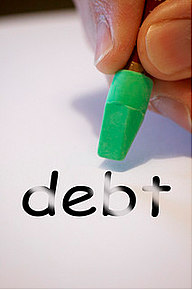 Making the choice between BANKRUPTCY and DEBT SETTLEMENT can be a daunting task. The fact is, one is not the clear winner. The option you choose will depend on several factors.
Making the choice between BANKRUPTCY and DEBT SETTLEMENT can be a daunting task. The fact is, one is not the clear winner. The option you choose will depend on several factors.
Here are some guidelines to determine whether Bankruptcy or Debt Settlement is the right choice for you.
DON'T THINK OF BANKRUPTCY AS A "GET-OUT-OF-JAIL-FREE-CARD"!
As I research and blog about the debt settlement industry I'm in, I see too many sites that seem to say that Bankruptcy is an easy way to START OVER.
That statement is both True and false.
Before we look into when you should choose Bankruptcy over Debt Settlement, just remember this...
Bankruptcy is a statement that you cannot pay the debts you owe. Say what you will, that is a hard thing to admit and can cause severe personal turmoil. Although most people who have to seek bankruptcy protection from creditors do so as a last resort, it is still a very big and tough decision mentally.
DEBT SETTLEMENT IS NOT THE SAME AS BANKRUPTCY
Whether you qualify for a chapter 7 or 13 (personal bankruptcy), you are basically walking away from the debts you have incurred. Your creditors get paid back very little, if anything on the money they originally loaned you with your promise to repay!
With DEBT SETTLEMENT, your creditors will get paid back approximately 50% of what you owe. This is better for you because it shows that you made an effort and paid back at least a portion of what you owed. Down the road, it will be easier for you to get credit when you need it.
BANKRUPTCY WILL SHOW ON YOUR CREDIT REPORT FOR UP TO 10 YEARS!
Make no mistake about it, bankruptcy will have an major affect on you and others!
You may not be able to rent an apartment for up to 2 years following a bankruptcy!
Many employment opportunities will not be available to you if you must state that you have declared bankruptcy in the past or if your prospective employer does a credit check!
Bankruptcy HAS A VERY NEGATIVE impact on your credit score!
In the long run, your credit and credit rating will not be as damaged through DEBT SETTLEMENT as it will be through BANKRUPTCY.
After a debt is settled, the credit reporting agencies:
- Experian
- TransUnion
- Equifax
...will show the debt with a $0 balance and "paid-as-agreed" or "paid-for-less-than-the-full-amount".
When your credit report shows that you have done something to take card of your outstanding debts, it will (believe it or not) start to improve rather quickly!
SO, DEBT SETTLEMENT IS ALWAYS BETTER THAN BANKRUPTCY?
NO! Again, debt settlement companies that only offer debt settlement have to say that, but it is just not true!
Reputable Debt Settlement companies will discuss all of your options so that you can make the right choice!
After 10 years of helping people get out of debt, I have found that in 99.9% of the time, the client found themselves in severe financial trouble from several circumstances of which they had no control. Such as:
- Loss of job and income
- Divorce
- Illness and/or disability
- Cut back on the hours of employment due to bad economy
- Forced retirement
- Fixed income that cannot keep up with inflation
At first, you use the credit cards to "JUST GET BY", with the intent on repaying them when things get better. However, in many cases, things don't get better and now you cannot keep up with the minimum payments. Then:
In a Debt Management Program, you will...
- Have ONE MONTHLY PAYMENT (it may or may not be lower than the total of the minimum payments you now have)
- Have interest rates and late fees are usually lowered or forgiven
- Usually pay back all of your creditors in 48 months or so
- Have improved your credit scores after your balances are $0
But, they question is, can you afford the MONTHLY PAYMENT?
If not, then you need to look at DEBT SETTLEMENT:
- One monthly payment (a payment you can afford based on your circumstances)
- Creditor call slow down and stop
- Creditors are paid a percentage of the debt owed (avg. 50% plus or minus)
- Once your creditors have agreed to a settlement and it is completed, your credit report will show a $0 balance and start to improve
Ifyou cannot even afford the Debt Settlement payment, then you need to consult a BANKRUPTCY ATTORNEY, but be careful! Not all attorneys specialize in bankruptcy and as the bankruptcy laws seem to always be changing, you must find one that is an expert!
STILL NOT SURE? WE CAN HELP! Give us a call at 1-877-492-4109 or simply click on the link below for a FREE Evaluation.

 If you live in Texas and are having problems paying your debts, you have some specific protection from debt collectors that other states don't provide!
If you live in Texas and are having problems paying your debts, you have some specific protection from debt collectors that other states don't provide!



 Making the choice between BANKRUPTCY and DEBT SETTLEMENT can be a daunting task. The fact is, one is not the clear winner. The option you choose will depend on several factors.
Making the choice between BANKRUPTCY and DEBT SETTLEMENT can be a daunting task. The fact is, one is not the clear winner. The option you choose will depend on several factors.
 We all know that using White Out on your credit report won't really fix anything.
We all know that using White Out on your credit report won't really fix anything. Just the word BANKRUPTCY sounds terrible! Before you decide if bankruptcy is best for you, here are 3 ways to avoid bankruptcy:
Just the word BANKRUPTCY sounds terrible! Before you decide if bankruptcy is best for you, here are 3 ways to avoid bankruptcy: Your getting calls from a debt collector, but you do not believe you owe the debt.
Your getting calls from a debt collector, but you do not believe you owe the debt.  If you have received wage garnishment due to a judgment issued on your unpaid credit cards or other personal loans, it may be possible to stop it.
If you have received wage garnishment due to a judgment issued on your unpaid credit cards or other personal loans, it may be possible to stop it.
 These days, more than ever, consumers are worried about their credit history and seeking credit help. It’s no wonder with up to 70% of credit reports containing very serious errors.
These days, more than ever, consumers are worried about their credit history and seeking credit help. It’s no wonder with up to 70% of credit reports containing very serious errors. A client called us the other day and asked, "Do you have to pay tax after settlement?"
A client called us the other day and asked, "Do you have to pay tax after settlement?"

